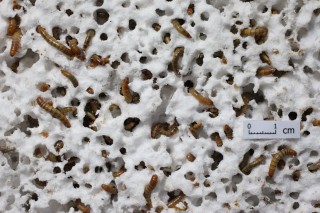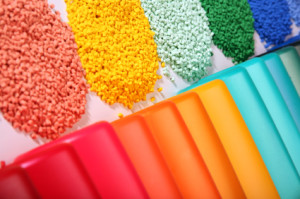Synthetic diamonds are typically created by subjecting graphite to immense pressure and high temperatures, which makes production in the industry low and costly. Things may be about to change due to new research performed at North Carolina State University. Researchers have found a new phase for carbon called “Q-carbon” which is produced at ambient temperatures and pressure. The structure is surprisingly close to diamond, with the added the added benefit of exhibiting a couple of unique properties, namely, Q-Carbon is actually harder than diamond.
Myths about Phthalates and Food Containers
 Most average consumers don’t know much about phthalates, and only adding to the confusion has been misreporting by the media of recent studies that have been conducted. One example was a series of “tips” to avoid phthalates that the media picked up on from a NYU professor who studied phthalates. The tips included things such as keeping plastic containers out of the microwave and dishwasher and discarding scratched plastic containers whose “protective coatings” may have been damaged. The problem? These tips were picked up and reported on TV and the internet, often along side pictures of plastic items that weren’t even made with phthalates in the first place.
Most average consumers don’t know much about phthalates, and only adding to the confusion has been misreporting by the media of recent studies that have been conducted. One example was a series of “tips” to avoid phthalates that the media picked up on from a NYU professor who studied phthalates. The tips included things such as keeping plastic containers out of the microwave and dishwasher and discarding scratched plastic containers whose “protective coatings” may have been damaged. The problem? These tips were picked up and reported on TV and the internet, often along side pictures of plastic items that weren’t even made with phthalates in the first place.
The fact is, it would be very unlikely to ever find phthalates in any microwavable containers to begin with. Phthalates are common additives to make PVC (polyvinyl chloride) plastic soft and flexible, and without them PVC is very rigid (think of plastic sewer pipes). So while you may find phthalates in items such as vinyl roofing membranes and shower curtains, most plastic food packaging and storage items are made with other types of plastics that do not require additives like phthalates.
Although phthalates have gained a media spotlight in recent years, they are nothing new to the market. Phthalates have been in use for 50 years, and have been studied extensively. Groups such as the American Chemical Council (ACC) has been helping to better educate concerned consumers, and has a variety of resources available on their websitewww.phthalates.org.
For More Information see the American Chemical Council’s informational page
Mealworms Present a Surprising Solution to EPS Waste
 EPS, or expanded polystyrene, is the plastic foam commonly found in food containers and has been a source of controversy due to the unrecyclable waste its use creates. Now researchers may have found an unlikely solution: Mealworms. The larvae of the darkling beetle will not only feed on EPS, but the microorganisms in their gut biodegrade the material, later expelling a seemingly harmless product that may be useful as soil for crops. The plastic doesn’t seem to be toxic to the bugs either. The research is still in its early stages, but many are excited by the possible implications for EPS recycling.
EPS, or expanded polystyrene, is the plastic foam commonly found in food containers and has been a source of controversy due to the unrecyclable waste its use creates. Now researchers may have found an unlikely solution: Mealworms. The larvae of the darkling beetle will not only feed on EPS, but the microorganisms in their gut biodegrade the material, later expelling a seemingly harmless product that may be useful as soil for crops. The plastic doesn’t seem to be toxic to the bugs either. The research is still in its early stages, but many are excited by the possible implications for EPS recycling.
For more information, see Plastics News.
Microbead Ban Passes House
A bill to ban the manufacture or sale of personal care products containing small plastic particles known as “microbeads” by the year 2019 was passed by the U.S. House following a December 7th vote. The bill (HR 1321) was introduced by Rep. Frank Pallone Jr. (D-NJ) an proposes banning microbeads manufacture beginning July 2017 and all sales of products containing them by July 2019. Microbeads are polypropylene or other plastic particles less than 5 millimeters in size and can be found in some personal care products ranging from facial exfoliators to toothpastes. Microbeads became an environmental pollutant concern once they were found to be contaminating waterways.
The bill will now move to the U.S. Senate and could get final approval as early at this week, which may land the bill on President Obama’s desk before the end of the year.
EPA Delays Chlorinated Paraffin Ban
The U.S. Environmental Protection Agency (EPA) announced a delay on a ban of the production and import of mid and long-chain chlorinated paraffins until mid-2017. Chlorinated paraffins (CPs) have long been used as additives in metalworking fluids, and groups such as the Chlorinated Paraffins Industry Association (CPIA) and the Independent Lubricant Manufacturers Association (ILMA) have been working to convince the EPA not to ban CPs at all. The ban was originally supposed to go into effect in May 2016, but the EPA announced the delay in order to give manufacturers time needed to transition.
EPA Releases Assessments in Chemical Screening Tests
Since the 1990’s, many scientists have pointed out various chemicals might be disrupting the endocrine systems of people and animals. In 1996 the U.S. Environmental Protection Agency (EPA) formed scientific advisory committee to investigate such claims, and by 1998 the committee developed an Endocrine Distruptor Screening Program (EDSP). The program uses a uses a two tiered approach to screen pesticides, chemicals, and environmental contaminants for their potential effect on estrogen, androgen and thyroid hormone systems.
On June 30, 2015 the EPA released the first Teir 1 assessments of the EDSP. 52 “List 1” chemicals were subjected to the screening, and of the chemicals tested the EPA concluded that majority of these chemicals either didn’t exhibit bioactivity in the screening tests or otherwise posed no risk. 18 chemicals were identified as showing a varied amount of interaction with one or more of the three endocrine pathways examined. These 18 chemicals are recommended for further Tier 2 studies.
For More Information see the EPA’s EDSP website.
Shell Moves Forward With Shale Gas
Back in June, Shell took further steps toward its investment in shale gas by purchasing a site near Pittsburgh for a plastics and petrochemicals plant. The preliminary plants indicated that the plant would have three polyethylene resin production lines as well as an ethylene manufacturing line, and seven ethane crackers. The site would be able to take advantage of the nearby ethane source from shale natural gas.
P&G Adds Bittering Agent to Improve Safety
Procter & Gamble Co. recently announced they would be adding a bittering agent to the outside layer of their single-use laundry packets. The move comes after reports of children who were attracted to the bright candy-like colors accidentally ingesting the packets, leading to poisoning. While the product has gained in popularity over the years for its easy of use, there were calls for changes to the product in response the unintended danger. Europe recently put new rules into place concerning the products, and Congress in the US is looking to do the same.
Bittering agents, such as denatonium benzoate, can be added to consumer products containing harmful substances in order to protect against accidental ingestion by small children or animals. The extremely bitter taste “elicits oral repulsive behavior” which prevents the substance from being eaten, and have been used for many years as a safety prevention method for poisonous or harmful products.
Global Outlook for Polyvinyl Chloride (PVC)
 Polyvinyl Chloride (PVC) is currently the third-largest volume thermoplastic and continues to show global growth. PVC demand is a price-sensitive market and has felt the impacts of the lower crude oil prices. After the major drop in crude oil prices last November, PVC prices began falling as much as 30% in some regions. Prices began to rebound in February of this year, reaching another peak during the second quarter of 2015. Today’s market is seeing an oversupply situation due to China’s investment in new vinyl capacity beyond its demand. North American PVC producers have benefited from the increased availability of ethylene driven by the sale gas boom. This in combination with their integration into chlor-alkali gives them a cost advantage position in comparison with other regions, and may foster further vinyl investments in the future.
Polyvinyl Chloride (PVC) is currently the third-largest volume thermoplastic and continues to show global growth. PVC demand is a price-sensitive market and has felt the impacts of the lower crude oil prices. After the major drop in crude oil prices last November, PVC prices began falling as much as 30% in some regions. Prices began to rebound in February of this year, reaching another peak during the second quarter of 2015. Today’s market is seeing an oversupply situation due to China’s investment in new vinyl capacity beyond its demand. North American PVC producers have benefited from the increased availability of ethylene driven by the sale gas boom. This in combination with their integration into chlor-alkali gives them a cost advantage position in comparison with other regions, and may foster further vinyl investments in the future.
Product Focus: Disodium Sebacate
Disodium Sebacate is a castor oil derivative which can be used in cosmetics, detergents, and as a corrosion inhibitor in lubricants. DSS is approved under CFR 21.178.3570 for incidental food contact in greases, and DSS has been used to replace sodium nitrites in aluminum greases. Its fine particle size allows it to be added to the grease during the cool down period with no additional processing.
